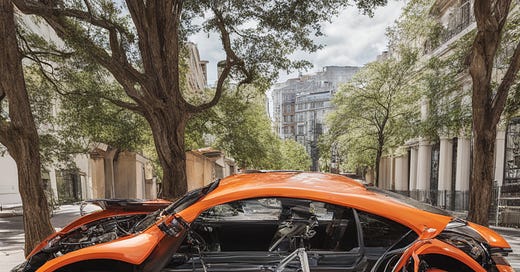Playing on "hard mode"
The grief (and peace) that comes with discovering your settings are different
One of many weird things about being a human is that while we consciously know there’s so much physical, cultural, and experiential variation from person to person, we still tend to assume that everyone thinks the same way we do.
Not that they have the same thoughts, but that they arrive at those thoughts using the same factory-issued pathways, synapses, logic, and subconscious systems that we do.
When I discovered I was autistic later in my early 30s, it was the first time that I really realized I had been operating with a batch of settings and features that were entirely different than almost everyone I’d ever interacted with before.
We’d been playing the same game, but I was playing in hard mode.
And, man, it explained so much.
Sure, I’d often felt like something was “off” with me or that things seemed harder for me, at times. But I always just blamed myself.
Allow me, if you will, an extended metaphor…
When you’re driving, you only see the body of the vehicles around you. There are plenty of makes and models — sure — but when you get down to it, a car is a car, and a truck is a truck, right? They all get you from point A to point B.
Imagine my surprise when, at 31 years old, I discovered that the vehicle I’d been operating didn’t look like everyone else’s when you looked beyond the surface.
Where a neurotypical has a gas pedal, I have bike pedals. But since we all talk about “pedals,” I had no idea mine were different or took more effort to use. When you show up and park your shiny red sedan next to all the other shiny red sedans, nobody talks about the mechanics of what it took to get the shiny red sedan there.
Unbeknownst to me and everyone around me, every foot of progress I made on the journey cost me far more physical energy than it cost others. By the time I arrive at our shared destination, my legs are sore, I’m physically exhausted, and my cheeks are as flush as the apparently identical red sedan I climbed out of.
But since the folks around me emerged from their shiny red sedans without so much as a single bead of sweat on their brow, I just assumed that I was the problem.
They got in their cars, put their feet on the pedals, and got here without egregious sweat stains and hair matted to their face, so why can’t I? (You’re welcome for the visual.)
It’s embarrassing to admit you’re struggling with something that seems so easy to everyone else. But even if you do fight through the embarrassment and you admit you’re struggling, the suggestions from other drivers rarely help.
“Have you tried using your air conditioning to keep cool,” they ask.
“I‘m already doing so much,” I say, “I don’t think I can.” I simply don’t understand how I’m supposed to have the energy to blow into the air tube that powers my car’s fan while I’m also pedaling at my maximum speed. My lungs are already burning, without the added burden of trying to create a breeze on my face.
“It’s not that hard,” they say, with a skeptical sneer. “Don’t be lazy.”
Since neither of us is aware that only they possess motor-powered fans and Freon infusions activated with the press of a button, my “reasons” are dismissed as “excuses,” and I find myself hesitant to admit struggles again in the future.
Everybody else just seems to “know” how to move through the world in their vehicles, and they talk about being “on autopilot” or “on cruise control.” I understand what they mean, but I can’t relate. Every drive is as stressful for me now as it was when I got in the car for the first time. It never gets easier for me.
It’s probably because I don’t really get the rules of the road. They are always changing depending on where I’m driving, what time of day it is, or who else is on the road. U-turns are either convenient or illegal. Sometimes you can turn right on red, and sometimes you can’t. Don’t even get me started on what happens to the usual way of driving when there’s a police officer parked nearby, an ambulance approaching, or a school bus stopped.
Thanks to all this illogical chaos that nobody told me about, I have to remain vigilant the entire time I’m driving, learning by watching others, and focused on making sure my every move is in alignment with the expectations of the drivers around me. (there really should be a handbook or a course for something so important.)
Occasionally, I also upset other drivers without meaning to.
“I waved at you earlier at the stoplight,” they say angrily, “and you didn’t wave back!”
I can see that they are hurt, but I had no idea they even waved. I apologize, and they tell me that other drivers always know when they’re waving.
“How are these people seeing each other clearly enough to wave,” I wonder, picturing my windshield plastered with dead bugs and mud and bird poop.
The angry driver thinks I’m being coy and scoffs at me, having no idea the advantage that their wiper blades and windshield washing fluid provide.
Once again, my “reasons” are reduced to “excuses,” and I’m left wishing my vision was as good as everyone else’s, so I could see through the mess like they do.
The late discovery comes with a bit of grief.
I can’t help but think of all the accidents I could have avoided if I’d known sooner. Even if the scratches from those accidents have been buffed out and painted over, the dents and dings remain. And they’ve added up over time.
I wonder how many waves from other drivers I missed before I knew how to manually wash my windshield every day. How many friends, relationships, and jobs were lost because people assumed I was rude, selfish, or condescending, and I didn’t know how to explain that I was struggling to see?
It’s sad to think about the opportunities I missed while I was lost on a side road, or all the peace I sacrificed unknowingly trying desperately to maintain an impossible pace to keep up with the motorized vehicles alongside me.
But there are positives to finding out my vehicle’s interior is different, too.
I don’t feel quite as much pressure to keep pace as I used to. I still don’t want to fall behind if I can help it, but I also acknowledge that my type of pedal is capable of different speeds than the motorized kind. If I’m a little late, that’s probably why. (And it’s probably NOT because I’m weak, lazy, or just “bad at” life.)
I’m also less nervous about piping up when I’m struggling. Because pedaling is hard work, and just because nobody else needs a breather partway through the journey, doesn’t mean I’m not entitled to stop and catch my breath. (Should probably also work on my cardio fitness, but, you know, baby steps.)
Plus, once I knew my actual make and model, I joined some forums for drivers like me and learned about some cool aftermarket products I could install to try to compensate for the deficits. (I’d still really love a motor, but I’m grateful to be able to acquire ergonomic pedals that help reduce the ache in my feet at the end of a long day of navigating this world.)
I’ll probably never have the type of GPS that makes it possible to navigate this world seamlessly, but I’m learning how to print out MapQuest directions before leaving the house. (Anecdotally, this is somehow still more effective than using AppleMaps.)
In the last year or so, I’ve managed to assemble an awesome pit crew to keep me and my vehicle operating optimally, including amazing roadside assistance folks I can call when I encounter an emergency. I’m also lucky to have one hell of a co-pilot in this adventure called life.
Thank you all for coming along for the ride. ♥️
/extended metaphor







This is the most perfect metaphor for autism. 💖 Thank you.
Thank you so much for verbalising this - don’t think I’ve ever come across such a good metaphor for what coming to terms with a late autism diagnosis is like.